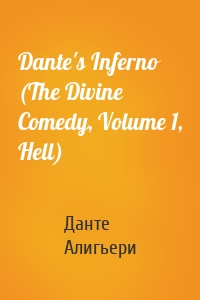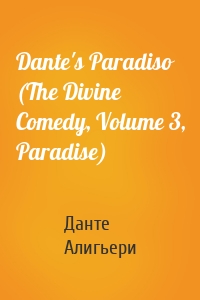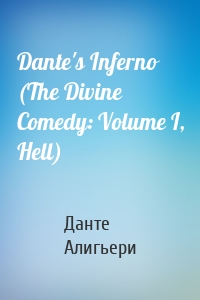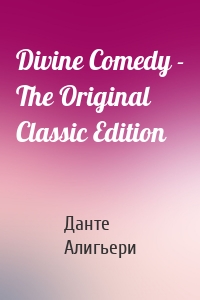Данте Алигьери
58 кн.
Dante's Inferno (The Divine Comedy,...
The «Divine Comedy» was entitled by Dante himself merely «Commedia,» meaning a poetic composition in a style intermediate between the sustained nobility of tragedy, and the popular tone of elegy. The word had no dramatic implication at that time, though it did involve a happy ending. The poem is the narrative of a journey down through Hell, up the mountain of Purgatory, and through the revolving heavens into the presence of God. In this aspect it belongs to the two familiar medieval literary...
| Автор | Данте Алигьери |
Dante's Paradiso (The Divine Comedy...
The «Divine Comedy» was entitled by Dante himself merely «Commedia,» meaning a poetic composition in a style intermediate between the sustained nobility of tragedy, and the popular tone of elegy. The word had no dramatic implication at that time, though it did involve a happy ending. The poem is the narrative of a journey down through Hell, up the mountain of Purgatory, and through the revolving heavens into the presence of God. In this aspect it belongs to the two familiar medieval literary...
| Автор | Данте Алигьери |
Dante's Inferno: The Divine Comedy,...
In his introduction, the translator says: «I suppose that a very great majority of English-speaking people, if they were asked to name the greatest epic poet of the Christian era in Western Europe, would answer Dante.» THE DIVINE COMEDY continues to be widely read today, whether for its religious inspiration or for the sheer power of its verse. The first part of the epic, THE INFERNO, tells how the narrator «loses his way,» and finds himself in a strange landscape he's never seen before....
| Автор | Данте Алигьери |
Dante's Purgatorio (The Divine Come...
Dante Alighieri was born in Florence, Italy in the middle of the 13th century and what is principally known of him comes from his own writings. One of the world’s great literary masterpieces, “The Divine Comedy” is at its heart an allegorical tale regarding man’s search for divinity. The work is divided into three sections, “Inferno”, “Purgatorio”, and “Paradiso”, each containing thirty-three cantos. It is the narrative of a journey down through Hell, up the mountain of Purgatory, and through...
| Автор | Данте Алигьери |
Dante's Paradiso (The Divine Comedy...
Dante Alighieri was born in Florence, Italy in the middle of the 13th century and what is principally known of him comes from his own writings. One of the world’s great literary masterpieces, “The Divine Comedy” is at its heart an allegorical tale regarding man’s search for divinity. The work is divided into three sections, “Inferno”, “Purgatorio”, and “Paradiso”, each containing thirty-three cantos. It is the narrative of a journey down through Hell, up the mountain of Purgatory, and through...
| Автор | Данте Алигьери |
Dante's Inferno (The Divine Comedy:...
Dante Alighieri was born in Florence, Italy in the middle of the 13th century and what is principally known of him comes from his own writings. One of the world’s great literary masterpieces, the “Divine Comedy” is at its heart an allegorical tale regarding man’s search for divinity. The work is divided into three sections, “Inferno”, “Purgatorio”, and “Paradiso”, each containing thirty-three cantos. It is the narrative of a journey down through Hell, up the mountain of Purgatory, and through...
| Автор | Данте Алигьери |
Divine Comedy - The Original Classi...
As many may know, Dante Alighieri was a man of great literary prowess, but was given drive by his single obsession to a small girl by the name of Beatrice. She rings true in this work, as the guiding angel, bringing Dante through the depths of hell, the wasteland of Purgatory, and finally, the glory of heaven. <p> His has been one of the most enduring works on the human spirit, and the concept of god as seen through Christianity. Full of pun and metaphor, this is rich in language, and...
| Автор | Данте Алигьери |
HELL
One of the masterpieces of world literature, completed in 1320, Dante’s La Divina Commedia describes his journey through Hell, Purgatory and his eventual arrival in Heaven. In this new version of Dante’s masterpiece, Alasdair Gray offers an original translation in prosaic English rhyme. Accessible, modern and sublimely decorated, this remarkable edition told in three parts yokes two great literary minds, seven hundred years apart, and brings the classic text alive for the twenty-first...
| Автор | Данте Алигьери |
The Divine Comedy (Translated by He...
Dante Alighieri was born in Florence, Italy in the middle of the 13th century and what is principally known of him comes from his own writings. One of the world’s great literary masterpieces, the “Divine Comedy” is at its heart an allegorical tale regarding man’s search for divinity. The work is divided into three sections, “Inferno,” “Purgatorio,” and “Paradiso,” each containing thirty-three cantos. It is the narrative of a journey down through Hell, up the mountain of Purgatory, and through...
| Автор | Данте Алигьери |






![Dante's Purgatorio (The Divine Comedy, Volume II, Purgatory) [Translated by Henry Wadsworth Longfellow with an Introduction by William Warren Vernon] Dante's Purgatorio (The Divine Comedy, Volume II, Purgatory) [Translated by Henry Wadsworth Longfellow with an Introduction by William Warren Vernon]](https://knigism.online/covers/58/d0/680652.jpg)
![Dante's Paradiso (The Divine Comedy, Volume II, Paradise) [Translated by Henry Wadsworth Longfellow with an Introduction by Ellen M. Mitchell] Dante's Paradiso (The Divine Comedy, Volume II, Paradise) [Translated by Henry Wadsworth Longfellow with an Introduction by Ellen M. Mitchell]](https://knigism.online/covers/d2/28/680735.jpg)



